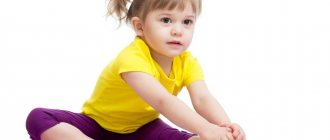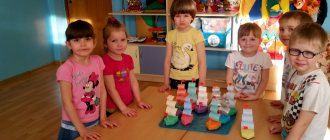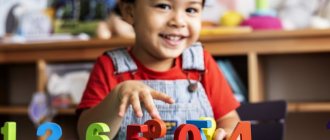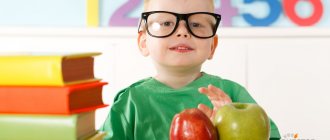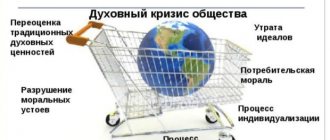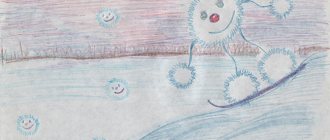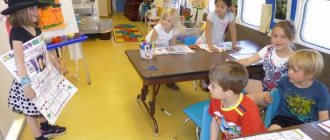Principles of studying the child’s psyche
The peculiarity of the methods of child psychology is determined by the characteristics of its object. This is the development of the child’s psyche from birth to 7 years, which is the most vulnerable and sensitive to external negative influences. Rough adult intervention can slow down or distort the course of a child’s mental development. Therefore, the main principle of the study of child psychology is the principle of humanism and educational optimism, which consists of the requirement not to cause harm. The psychologist should feel especially responsible and take his time; the main thing is to understand the real reasons for the child’s behavior, recognize psychological characteristics and patterns, and at the same time show a tactful, sensitive, attentive approach to the child.
The principle of effectiveness and scientificity involves the study of psychological development, its mechanisms and patterns in terms of child psychology, and not in terms of other sciences. Before you begin to study this world of a child, it is necessary to master special psychological knowledge, concepts and basic ideas of psychological science.
The principle of determinism is based on the fact that the formation of psychological functions and characteristics, as well as the characteristics of their manifestation, is associated with both external and internal reasons. These reasons are determined by the circumstances of life, the child’s upbringing, the characteristics of his social environment, the nature of the child’s communication with adults and peers, and the characteristics of his activities and activities. Initially, there are no “good” or “difficult” children, there are only many reasons that influence the subsequent appearance of one or another characteristic characteristic of a given child. The researcher's task is to understand and thus explain the cause of a psychological fact.
The principle of development of the psyche and consciousness in activity shows that activity is a condition for the manifestation and development of the child’s psyche. Therefore, to study his mental qualities, it is necessary to organize appropriate activities, for example, creative imagination can be recorded in drawing or writing a fairy tale.
The principle of the unity of consciousness and activity (developed by S.L. Rubinstein) means the mutual influence of consciousness and activity. On the one hand, consciousness is formed in activity and “leads” it, be that as it may. On the other hand, the increasing complexity of activity and the development of new types of activity enriches and changes consciousness. Thus, consciousness can be studied indirectly by studying the activities of the child. Thus, the motives of behavior become clear from the analysis of actions.
The principle of an age-specific individual and personal approach implies that the general laws of mental development manifest themselves in each child individually, including regular and special characteristics. Each child learns to speak, walk, and act with objects, but the path of his development is individual.
The principle of completeness, consistency and systematicity suggests that one study does not provide a complete picture of the child’s mental development. It is necessary not to analyze individual facts, but to compare them, to monitor all aspects of the development of the child’s mentality as a whole.
Leading needs of a preschooler
The psychology of preschool children often contains contradictions. For example, at this age they have two new needs:
- communication with other children;
- the need to be engaged in some activity important to society.
But the child cannot fulfill the second need in society. How can he resolve this contradiction? This is precisely what leads to the emergence of role-playing games, which enable preschoolers to play the roles of adults who are engaged in socially important activities.
An important need for a baby at this age is the need for acceptance and unconditional love. It is important for him to feel that he is special to his parents, and that he is loved simply for who he is. Parental acceptance and love creates a strong foundation for healthy self-esteem. Having matured, the child will not “curry favor” in order to earn love.
Unconditional love does not mean no punishment for wrongdoing. But parents need to separate personality and actions and punish the child precisely for his misdeeds, and not because he is “bad.” We need to explain to him that he is good and loved, but his parents must punish him for his misconduct.
Methods for researching psychology of preschool age
A method is a general strategy, a general way of obtaining facts, determined by the task and object of research, as well as the theoretical concepts of the researcher. Observation is the main method when working with children (especially preschool age), since tests, experiments, and surveys are difficult to study children's behavior. Observation must begin with a goal, an observation program, and an action plan. The purpose of observation is to determine what he is trying to achieve and what results can be expected from him.
To obtain reliable results, monitoring must be carried out regularly. This happens because children grow very quickly, and the changes that occur in their behavior and psyche are equally fleeting. For example, an infant's behavior changes before our eyes, so missing a month deprives the researcher of the opportunity to obtain valuable data on development during this period.
The younger the child, the shorter the interval between observations should be. During the period from birth to 2-3 months, the child should be monitored daily; at the age of 2-3 months to 1 year - weekly; from 1 year to 3 years - monthly; from 3 years to 6-7 years - once every 6 months; at primary school age - once a year, etc.
The observation method is more effective when working with children, on the one hand, because they behave more directly and do not play social roles characteristic of adults. On the other hand, children (especially preschoolers) do not have sufficient attention span and are often distracted. Therefore, where possible, covert observation should be used so that children cannot see the observer.
Speech development
At preschool age, the centers responsible for speech functions mature in the child’s psyche, and the process of mastering native speech is completed. The little man's vocabulary increases significantly. At six years old, a child’s active vocabulary contains 2500-3000 words. This is three times more than that of a three-year-old child.
However, these indicators depend entirely on the environment in which children grow up. Preschoolers have a large vocabulary if their parents talk to them a lot and read fairy tales and stories with them (this is how they become familiar with literary speech).
This period is characterized by the so-called word creation of children - the ability to form bizarre forms of words or use words in an unusual meaning.
Formative methods in psychology
Formative methods are methods in psychology that include variants of social experiments in which the subject is a group of people.
This group includes:
- Transformative experiment
- Psychological and pedagogical experiment,
- Formative experiment
- Experimental genetic method,
- Step-by-step teaching method, etc.
A distinctive feature of research methods is their establishing nature - spontaneously emerging empirical features and levels of mental development are subject to description, measurement, and explanation. Formative research methods are used in connection with the restructuring of certain features of the educational process. The use of formative methods shows the impact of perestroika on the age, intellectual and characteristic characteristics of the subjects.
The formative experiment method is often used to compare the effects of different educational programs on a child's intellectual development.
A formative experiment is a statistically significant, mass experiment, the area of which is at least one school, one educational team. It is also a long-term, protracted experiment in introducing a general theoretical concept into psychology. This is a complex experiment that requires the joint efforts of psychologists, theorists, practitioners, researchers, didactics and methodologists, therefore it must take place in special institutions that have the conditions for its organization.
A formative experiment is a significant restructuring of psychological and pedagogical practice and, above all, a restructuring of content and methods, which leads to significant changes in the entire course of mental development and the characteristic features of the subjects.
This type of research methods, due to its characteristics, makes it possible to identify reserves of mental development, creates new psychological characteristics of subjects, therefore they are included in a special group of methods of psychological research and influence. Formative methods make it possible to form the mental processes of perception, attention, thinking, and memory.
With the development of psychology, theories, psychological concepts and research methods change, which lose their defining character and become formative or transformative.
In experimental psychology, formative experiment becomes the leading research method.
Pochemochki, greedy and brawlers
Preschool age is the age of a thousand and one questions. The baby is actively exploring the world, and he is interested in knowing everything: what the sun is made of, and why the bag rustles. Although sometimes these questions are inappropriate, always take the time to answer them. This way you broaden your baby’s horizons and strengthen your relationship.
On the playground you can often see little “greedy” children who do not want to share toys with other children. Mothers who do not want conflicts urge their children to give the toy away to play with. But is this right? Preschool children are still characterized by selfishness, and it is important for them to “own” their toys. Besides, there is nothing wrong with a sense of ownership over your toys. Imagine if a person came up to you and asked you to play on your phone. You would refuse, and others would call you greedy.
This is how a child feels when asked to give his toy to another. It’s better to explain to your child that the toy belongs to him, and if he wants (I emphasize: if he wants), he can give it to someone else to play with, but that child will definitely return it. If the baby does not want to give, it is his right to dispose of his toy.
There are also children who strive to hit, push or call you names. Firmly, but without anger, stop the child. Usually at the age of 4 years, the child begins to test the boundaries of other people. In other words: “How can I interact with others?” And if unwanted behavior is not stopped, it will continue to appear.
Experimental method in working with preschool children
A method is a way of obtaining facts determined by the task and object of study.
The most reliable method of obtaining information about the behavior and psychology of a child is the experimental method, the essence of which is to induce mental processes in the child that are interesting to the researcher and create conditions for the manifestation of these processes.
The child behaves naturally and directly in an experimental play situation, reacts emotionally to the situations offered to him, and does not play social roles, which makes it possible to obtain real reactions to the influencing stimuli.
As a rule, the results are more reliable when the experiment is carried out in the form of a game. This form of play must take into account the interests and needs of the child so that he can fully develop his intellectual abilities and the necessary psychological characteristics.
Throughout the experiment, it is important to maintain the child’s interest in the activity being performed, since the child acts spontaneously and instantly.
Based on the fact that a child’s behavior will differ under different experimental conditions, we can draw conclusions about his psychological characteristics. By comparing the nature of one's behavior, the preferred one is determined, and on its basis the basic form of his communication is established.
The experiment is an effective and economical method, so it has found wide application in child psychology.
Psychological experiments involve a kind of test - a system of specially selected tasks. These tasks are offered to children under strictly defined conditions. Each task is scored and should not depend on the attitude of the experimenter.
Age standards and age groups must correspond to each other. By comparing the results with age norms, it is possible to determine the current stage of development of the child, i.e. developmental deviation or progress for his age.
This strategy of experiments is called a strategy of reductions, because in one step the level of both age-related and individual development of a particular mental process is revealed.
Often research combines experimentation and observation. However, they only note the characteristics of the child’s behavior or the degree of success in solving the assigned tasks, but do not specify what is behind the identified manifestations and do not lead to an understanding of the conditions and driving forces of the child’s development.
Formative experiments have a great advantage in this regard. It forms in children new abilities that have not previously been observed during the experiment, so it can be called a strategy for the experimental genesis of mental abilities.
The researcher formulates in advance a hypothesis about what underlies mental abilities and under what conditions these abilities develop. Then these conditions are modeled and a number of formative influences are imposed on the child.
Finally, the researcher determines whether there are changes in the mental abilities being studied. As a result, hypotheses about the psychological causes and conditions of the child’s mental development are tested.
The formative experiment can be continued for several years with the same children.
Game as a way of development
Preschool psychology defines play as a leading activity in the development of children of this age. What does "leading activity" mean? This means that it is this activity that has the main influence on the development of the child’s personality and all his mental processes.
During the game, the child learns to control his behavior according to the chosen role. This is how his voluntary behavior is formed. But you should not think that the game for the baby is just a fantasy, a pretense. No. For him, a game is an emotionally rich and absolutely real activity, where he can become anyone: a doctor, a salesman, a teacher, a knight or a princess.
Playing together helps children develop communication skills and also contributes to the emergence of social motives (achieving success, leadership).
During the process of role-playing play, the preschooler develops the following new formations:
- subordination of motives, that is, the ability to subordinate one’s personal desires to the rules of the game;
- learning the ability to communicate with other children. He masters the skills of interacting with peers, gaining both positive communication experiences (friendship, shared toys) and negative ones (grievances, quarrels);
- mastering the word “MUST”, and understanding that it is much stronger than the word “WANT”.
What services does a child psychologist provide?
A child psychologist provides consultations for parents, psychological diagnostics (psychodiagnostics) of the child, diagnoses the parenting style used by parents, and conducts individual and group classes with children.
A child psychologist can conduct art therapy, fairy tale therapy, sand and play therapy, and psychocorrectional classes with the child.
A specialist can conduct various educational seminars, courses and trainings for parents.
The child and family psychologist of our project also conducts Skype consultations for parents and diagnoses the parenting style with subsequent recommendations.
Areas of work of a child psychologist
The areas of work of a child psychologist include:
- Consulting the child's parents;
- Individual lessons with a child;
- Psychodiagnostics of child-parent relationships;
- Psychodiagnostics of the child’s personality;
- Corrective activities with the child;
- Developmental classes with the child are individual;
- Developmental classes with the child in groups;
- Career guidance for high school students;
- Conducting seminars and trainings for parents.
Principles of work of a child psychologist
- Do no harm.
- Don't judge.
- Maintain an impartial perception.
- The principle of informed consent is the need to explain to parents all the features of psychological work with their child.
- Recognize the right of the child and parents to any feelings.
- The principle of confidentiality, i.e. maintaining professional secrets.
- The principle of professional competence: do not take on those areas of work in which you yourself are well versed, do not use psychological techniques that you do not properly master.
Algorithm for the work of a child psychologist
A child psychologist first meets with the child’s parents to find out all the details related to the reason for seeking help. Sometimes a psychologist may decide to invite not only the parents, but also the child to the first consultation, so that everyone can take part in the conversation together. As a rule, if a child is a schoolchild, he can fully participate in a joint conversation. The child psychologist then decides what type of psychological assistance will be provided to the child and his family.
What education does a child psychologist have?
A child psychologist has a higher education in psychology. A basic course in developmental and child psychology is included in the mandatory list of disciplines for obtaining higher psychological education. If a psychologist decides to choose a specialization in child psychology, he can take advanced training courses in child psychology, various trainings and seminars.
To become a child psychotherapist, you must obtain a medical education as a psychiatrist.
You can read more about the education and work experience of our online school psychologist Ekaterina Kes here.
How to help a child develop?
There is a concept called the “zone of proximal development.” It was introduced into psychology by the famous Soviet psychologist L.S. Vygotsky. The zone of actual development is the child’s skills that he performs independently, without the help of adults.
Also, in preschool age, a child actively develops many mental functions, and with the assistance of an adult, he can learn a lot. You just need to do it not FOR him, but TOGETHER with him. What a preschooler can do with the help of an adult, a little later he will be able to do on his own. This is called the zone of proximal development. If you want to teach your child something, do it with him first. In addition, this is how we develop his confidence in his abilities.
We are always in a hurry to get somewhere, and it seems easier and faster to do something for the child. But then we expect that he himself will be able to put away toys, cut out paper and put clothes in the closet.
Children are capital in which you need to invest time and attention, and they will pleasantly surprise you.
